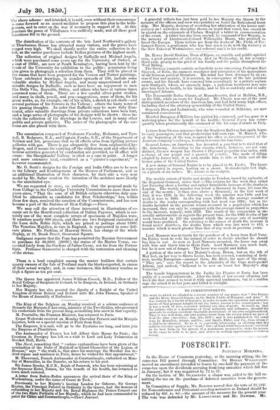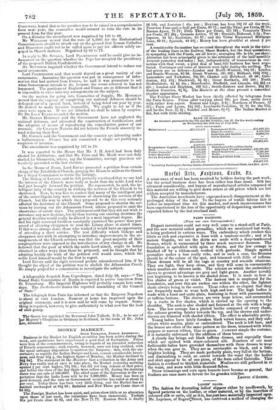POSTSCRIPT.
SATURDAY MORNING.
In the House of Commons yesterday, at the morning sitting, the In- come-tax Bill passed through Committee. Sir HENRY WILLOUGHBY moved an amendment intended to lessen by one-half the payment of In- come-tax upon the dividends accruing from long annuities which fall due in January, but it was negatived by 72 to 37. On the motion of Mr. GLADSTONE a clause was added to the bill re- mitting the tax on the purchase of deferred annuities from the govern- ment. In Committee of Supply, Mr. BAXTER moved that the vote of 21,192/. for Nonconformist and Protestant seceding ministers in Ireland should be reduced by 691. 48. 8d.—the amount of the measure for the present year. The vote was defended by Mr. LABOUCHERE and Mr. Dawson.. Mr.
CARDWELL hoped that as the question was to be raised in a comprehensive form next year, the committee would consent to take the vote in its present form for this year. On a division the amendment was negatived by 126 to 40.
Mr WILLI/our moved that the vote of 3,588/. for the Ecclesiastical Commissioners should be struck out on the ground that Roman Catholics and Dissenters ought not to be called upon to pay for officers solely en- gaged in Church matters. Negatived by 82 to 72.
In reply to Mr. Scutt; Lord Pm:melts-nix said he could give no in- formation on the question whether the Pope has accepted the presidency ' of the proposed Italian Confederation.
Mr. BENTINCH inquired whether tho Government intend to reduce our naval armaments.
Lord PALMERSTON said that would depend on a great variety of cir- cumstances. Assuming the question was put in consequence of infor- mation that had arrived from France, he said it was premature to ask what Government intends to do, because the event referred to has not happened. The positions of England and France are so different that it is impossible to enter into any arrangements on the subject.
On the motion for going into Committee of Supply, Mr. HORSMAN moved that the expense of completing our national defences should be defrayed out of a special fund, instead of being doled out year by year. He desired to make invasion impossible. We ought to act as if the • crisis were upon us. If we are attacked we shall be taken by surprise. Sir DE LACY Evaxs seconded the motion.
Mr. SIDNEY Hennenr said the Government have not neglected the national defenoes, and advocated the construction of fortifications and the adoption of means of reproducing the reproductive power of our arsenals. Sir CHARLES Nartrat did not believe the French sincerely in- tend reducing their fleet.
Mr. COBDEN said the Government and the country are labouring under a hallucination. France has not committed a single act justifying a suspicion of invasion.
The amendment was negatived by 167 to 70.
It was reported to the House that Mr. J. H. Astell had been duly elected for Ashburton ; and that Mr. Price and Mr. Monk were not duly elected for Gloucester, where, say the Committee, corrupt practices ex- tensively prevailed at the last election.
In the House of Peers, Lord EBURY presented a petition from certain clergy of the Established Church, praying the House to address the Queen for a Royal Commission to revise the Liturgy. The Bishop of LONDON said he felt perfectly convinced that no one had the interest of the Church more truly at heart than the noble Lord who had just brought forward the petition. He represented, he said, the in- telligent laity of the country in wishing the services of the Church to be shortened. Now, lie was free to confess that many of the intelligent and of the unintelligent laity were desirous of shortening the services of the Church, but the way in which they proposed to do this very seriously affected the doctrines of the Church. Some proposed to shorten the ser- vices by leaving out the Athanasian Creed, others proposed to omit the observance of saints' days. The petitioners said that they did not 'wish to introduce any new doctrine, but by thus leaving out existing doctrines the general doctrine would really be altered in a most important degree. He and his right reverend brethren constantly exercised the power thus pos- sessed of allowing clergymen to read the Litany alone at stated times. If this were always done, those who wished it would have an opportunity of attending a short service. The real difficulty which bishops and clergymen met with in attempting to introduce improvements in the ar- rangements of the Church services was that the great majority of their congregations were opposed to the introduction of any change at all. He believed that the good at which the noble Lord aimed, might be better obtained in other ways than those he proposed, and he thought that by adopting hastily the wish of the petition evil would arise, which the noble Lord himself would be the first to regret.
Lord DICEY said the right reverend prelate misunderstood him if he thought the object of the petition was to abolish the Athanasian Creed. He simply prayed for a commission to investigate the subject.



























 Previous page
Previous page